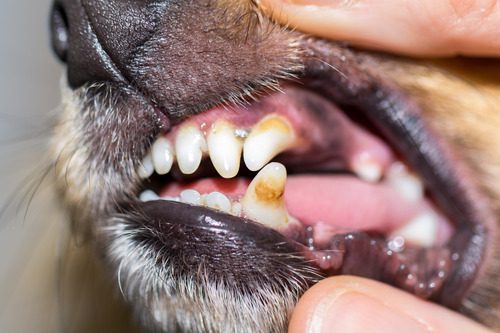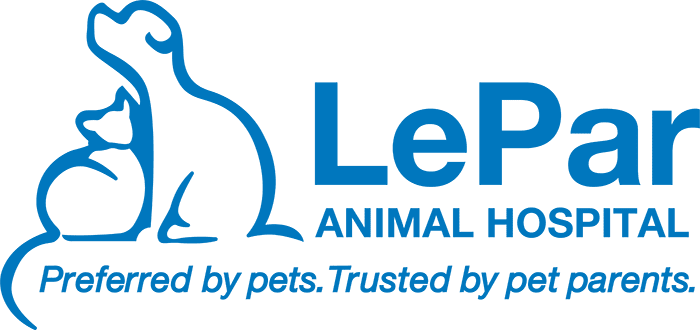My Dog’s Teeth Are Brown: Causes for Brown Teeth in Dogs
As a pet owner, you may have noticed that your dog’s teeth are brown and wondered what could be causing this discoloration. Brown teeth in dogs can be a sign of various dental issues that might need professional attention. In this blog, we will explore the common causes of brown teeth in dogs and what you can do to address them. For expert veterinary care, call LePar Animal Hospital at (708) 423-3200 or book an appointment online.

What Are Potential Causes of Brown Teeth in Dogs?
Brown teeth in dogs can result from multiple factors including:
Plaque and Tartar Buildup
Plaque and tartar form when bacteria in your dog’s mouth mix with food particles. If not removed through regular brushing, it hardens into tartar, which appears as a brown or yellow deposit on the teeth. Over time, this buildup can lead to gum disease, tooth decay, and bad breath. Regular brushing with dog-friendly toothpaste, professional dental cleanings, and dental chews can help prevent plaque and tartar buildup.
Tooth Decay and Cavities
Just like in humans, cavities in dogs occur when bacteria in the mouth produce acids that erode the tooth enamel. You may notice your dog has bad breath, brown spots on their teeth, or appears to be in pain when chewing. A veterinarian can clean and fill cavities or, in severe cases, extract the affected teeth to prevent further pain and infection.
Staining from Food and Treats
Ingredients in dog food, especially those with artificial coloring, can lead to brown stains. Wet dog food, pig ears, and other chew treats can contribute to staining. Opt for high-quality dog food without artificial colors and provide your dog with dental chews designed to clean their teeth as they chew.
Gum Disease
Gum disease, or periodontal disease, occurs when plaque and tartar extend below the gum line, causing inflammation and infection. This disease progresses from gingivitis (inflamed gums) to periodontitis (severe gum infection). Look for red, swollen gums, and bad breath. Treatment includes professional cleaning, antibiotics, and sometimes surgery to remove infected tissue.
Why Is Regular Dental Care Important?
Maintaining your dog’s dental health can help prevent brown teeth and other oral issues. Regular dental care not only improves their oral health, but also their overall well-being.
Brushing Your Dog’s Teeth
Brushing your dog’s teeth regularly is one of the best ways to prevent plaque and tartar buildup. Using a toothbrush and toothpaste specifically designed for dogs, start by letting your dog taste the toothpaste. Gradually introduce the toothbrush, and brush gently in circular motions, focusing on the gum line. Aim to brush your dog’s teeth at least 2-3 times a week, or as recommended by your veterinarian.
Professional Dental Cleanings
Veterinarians have the tools and expertise to clean below the gum line, where plaque and tartar are most harmful. During a professional cleaning, your dog will be under anesthesia. The veterinarian will remove plaque and tartar, polish the teeth, and may take X-rays to assess any hidden issues. Most dogs benefit from annual dental cleanings, but your veterinarian may recommend more frequent cleanings based on your dog’s needs.
Impact of Dental Health on Your Dog’s Overall Health
Dental problems can lead to more serious health issues if left untreated.
Potential Health Risks
Untreated dental disease can result in tooth loss, painful infections, and can even affect your dog’s heart, liver, and kidneys. Bacteria from infected gums can enter the bloodstream and spread to vital organs, causing systemic health issues. Look for signs such as weight loss, decreased appetite, and lethargy, which may indicate underlying health issues linked to poor dental health.
Preventive Measures
Preventing dental disease in your dog involves regular dental care at home and routine check-ups with your veterinarian. In addition to brushing, provide your dog with dental chews, toys, and a diet that supports dental health. Regular check-ups allow your veterinarian to monitor your dog’s dental health and catch issues early before they become severe.
How to Know When Your Dog Needs Professional Care
The following signs of dental issues indicate your dog needs professional veterinary attention:
- Brown teeth
- Bad breath
- Difficulty eating
- Bleeding gums
- Pus around the teeth
- Tooth abscess
Regular at-home care, combined with professional veterinary cleanings, can make a significant difference in your dog’s oral and overall health. To schedule your pet’s next teeth cleaning, call LePar Animal Hospital at (708) 423-3200 or book an appointment online. Our experienced team is here to help you provide the best possible care for your best friend.
Recent Posts
About Us
LePar Animal Hospital has served generations of pets and families in Evergreen Park, Oak Lawn, Palos, and neighboring suburbs, and we hope to serve generations more! Our animal hospital is accredited by the American Animal Hospital Association (AAHA) and staffed with Fear Free Certified veterinarians providing a multitude of services, from wellness and dental care to acupuncture, chemotherapy, and surgery.
